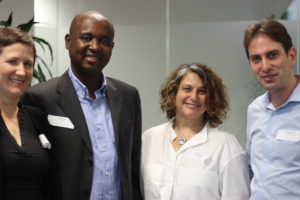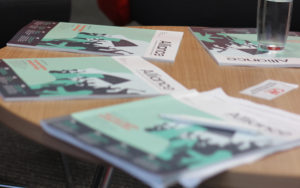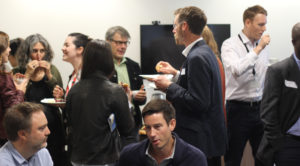‘Why is human rights so important to philanthropy? On one level, obviously, human rights underpins the rule of law, and is the basis for a democratically functioning society…but it’s also because some of the values at the heart of philanthropy are remarkably consistent with human rights activism – to challenge orthodoxy, foster dissent, and change the status quo.

From left to right: Julie Broome (Ariadne) John Kabia (Fund for Global Human Rights) Deborah Doane (Rights CoLab) and Charles Keidan (Alliance magazine).
‘In relation to human rights philanthropy – more or less five per cent of funding – we’re really talking about liberal philanthropy. Sometimes we see philanthropy as homogenous – all of it committed to the public good in particular ways or forms, but actually we might be talking about a clash of political orientations between liberal and conservative visions of the world embedded in philanthropic form. In my editorial, I note that conservative philanthropy has backed some of the most regressive people, organisations and ideas, both in America and around the world… but equally we have liberal philanthropy offering a different path. Although this may be more true of philanthropy staff than philanthropists themselves, depending on how they made their money.’
So began Alliance editor Charles Keidan in his strong opening statement at the Human Rights Breakfast Club last week. Keidan chaired this event, accompanied by experienced panellists: Julie Broome, director of Ariadne and one of the guest editors of the September issue; John Kabia, programme officer for thematic initiatives at the Fund for Global Human Rights (FGHR) also a guest editor of the September issue; and Deborah Doane, former director of the Funders’ Initiative for Civil Society (FICS) and current partner at Rights CoLab.
‘This was a really interesting time to try to do this issue, and to really think about what human rights philanthropy really means,’ began Julie Broome. ‘A few years ago, this would have been a different conversation…It feels like we’re on the defensive, having to justify the movement, what it’s doing, and why.’ At a time of extreme polarisation for many, Broome explained, there are now very strong views, and a real pushback against even the concept of human rights. Pushback against the political mechanisms of the state, against societal challenges and even that ‘we shouldn’t be protecting minorities because it’s harmful to others.’
Having worked in and come from the global south, I think it’s important that we draw from those voices. Often our grantees are used as subjects of journalistic interest and not the authors of their own stories.
Human rights has been seen in the past as the purview of lawyers and the elite, said Broome. The real challenge now is ‘how we really start to build bridges and to communicate about who we are, what we’re doing and why this is for the benefit of everyone.’ Broome cited Matthew Hart’s article as important, describing the ‘strong forces with a lot of money’ aligning with churches and conservative leaders to push back on gains made within the LGBTI community.
‘I really want to recognise that this is a challenging time and a difficult issue to work on and support, because funders do sometimes come under challenge for the work they support.’ Referencing Open Society Foundation’s (OSF) office closures in Budapest as a prominent example, Broome wished to acknowledge how hard the work can be, but that actually ‘we have been seeing an increase in funding for human rights… The data shows that this isn’t just a project of money coming from the global north, but lots of philanthropy is being generated in the global south for these issues as well.’
 John Kabia was next to speak, and was keen to acknowledge from the outset the issue’s diverse range of contributors. Kabia also recognised that the issues provoked within the special feature were also part of ongoing conversations happening both at the Fund where he works, and within other networks they attend. ‘Over the past two years, we have had to ask hard questions about what we can do… we have to dig deep and see what we have not been doing well.’ For Kabia, then, it was critical to have this broad depth of voices ‘from diverse geographies, sections of society. Especially having worked in and come from the global south, I think it’s important that we draw from those voices. Often our grantees are used as subjects of journalistic interest and not the authors of their own stories.’
John Kabia was next to speak, and was keen to acknowledge from the outset the issue’s diverse range of contributors. Kabia also recognised that the issues provoked within the special feature were also part of ongoing conversations happening both at the Fund where he works, and within other networks they attend. ‘Over the past two years, we have had to ask hard questions about what we can do… we have to dig deep and see what we have not been doing well.’ For Kabia, then, it was critical to have this broad depth of voices ‘from diverse geographies, sections of society. Especially having worked in and come from the global south, I think it’s important that we draw from those voices. Often our grantees are used as subjects of journalistic interest and not the authors of their own stories.’
The key point, says Kabia, ‘is how do we connect the human rights movement with the needs and realities of people on the ground? For years, not just in the global south, we have seen a disconnect from what human rights groups do, and the issues within communities.’ Building on Victoria Ibezim-Ohaeri’s piece within the special feature, Kabia continued that economic, social and cultural rights have often been neglected within the human rights movement, and seen as the ‘nice to have’ rights. ‘As Victoria so aptly captured, what are human rights to someone who is hungry, thirsty and struggles to put a roof over their head?’ Building stronger connections, and working on economic and social inequalities, will ultimately strengthen civil and political rights.
Kabia described the work by foundations and philanthropy as courageous and pioneering, yet ‘this is not an easy area, and not an easy sector. The work itself has huge political ramifications. It’s very sensitive and some foundations are very careful to not touch political things. It’s critical that we support activists…. and philanthropy is lagging behind.’ He encouraged foundations to be more open-minded, and to provide more general and flexible support to organisations in order to give them agency. ‘One thing philanthropy should be looking at is to provide flexibility for agency in local groups, to be open to innovation and to new actors. Philanthropy’s modus operandi is to support staffed NGOs. This is a very important part of the ecosystem, but we are seeing new formations of activism.’ Focusing on only one form limits both philanthropy and any possibilities for regaining trust and stronger connections.
Deborah Doane was the last to speak noting three things she took away from the issue:
- ‘Get more local. How do we get more out of our capitals and make things relevant? How do we make human rights relevant to people’s day to day lives?’ Doane commented that funders shy away from community-organised funding as it feels too political.
- ‘Human rights philanthropy needs to be a lot more systemic. Everything is connected, but one thing that was missing in this issue is corporate power…. Corporate power plays a big role in the breaking down of our respect for human rights.’
- ‘Philanthropy needs to be open about defending its values. It is not fair that OSF is the lightning rod.’ Now is not the time, said Doane, ‘to do three years of analysis on what will and won’t work. There will be failure, not every group is going to succeed in opening democratic spaces, but we need to be more vocal. Be courageous’.
Broome stated that ‘donors are certainly taking this issue on, even if it’s not reflected here.’ With tech, there is a ‘clear intersection between the power of Google and Facebook, and how they’re pushing an agenda that is not respectful of our human rights.’ More broadly, Broome spoke of violence on the ground from private security firms of corporations as well as by states. Broome argued that more of a framework needs to be created, as these corporations are able to violate the human rights of an individual or community and not be held accountable.
So many other philanthropists want to do the right thing, which is why it is important they provide that learning space, where foundations can compare notes and collectively improve practice.’
Keidan then provided an insight from a recent report from the Human Rights Funders Network (HRFN), which noted that when foundations are associated with a thematic network, in this case a network of human rights funders, their funding is more purposeful and more strategic. Given that Ariadne is a European peer-to-peer network, Keidan asked Broome how she saw this in a European context. Broome replied that the challenge is the political perception of human rights. Whilst Ariadne was initially established as a human rights network, they consciously changed to ‘European funders for Social Change and Human Rights’ to bring in other organisations and help highlight to them that what they’re doing is human rights work. Broome also mentioned that human rights isn’t necessarily seen as charitable within the tax frameworks of some countries. Ariadne helps to identify what is already being funded which has a human rights dimension to it, but Broome admitted that this term is ‘increasingly toxic for all of the reasons we’ve talked about, and so we need to adjust language.’
Keidan then brought the discussion around to Bill and Melinda Gates – whose foundation is listed as the ninth largest human rights funder globally – as he recently awarded India’s Prime Minister Narendra Modi a prize for his work on sanitation. With many activists and scholars questioning the morality of this, Keidan asked the panel their views on whether it was accurate to classify the Bill & Melinda Gates Foundation as a ‘human rights funder’. Doane responded with her belief that ‘if you fund in one space, but contradict in another, it’s problematic. I would not want to see them as a human rights funder. Activists on the ground say this, and that’s the benchmark for me.’ Kabia agreed with Doane that it’s important to take the lead from what local activists think is acceptable. He added, ‘networks and collaboratives like Ariadne and HRFN have a role to play in philanthropy education. So many other philanthropists want to do the right thing, which is why it is important they provide that learning space, where foundations can compare notes and collectively improve practice.’
https://twitter.com/__motunrayo/status/1177166788305543168?s=20
It was then time for audience questions. James Whitehead, director at Forest Peoples Programme, asked about conversations surrounding collective and individual rights. Broome answered that individual rights have historically been prioritised over the collective, but that she believed this to be changing. ‘Philanthropy struggles a bit with supporting movements because it doesn’t know how to do it’. Often these collective efforts don’t have a professional hierarchy, and whilst many foundations at staff level are thinking about where to support on-the-ground changes, ‘it starts to break down at the higher level. Funds are being created specifically to support activists, but I 100 per cent think that it has not been as recognised as it needs to be.’
‘In the global north,’ responded Kabia, ‘the individual trumps the collective, and in the south it’s the notion of the community. That has its own shortcomings. Focusing on communities misses out the individuals within them, and sometimes entrench those power dynamics.’ Doane commented that within the closing space agenda ‘there’s been a lot of effort placed on human rights defenders (HRD’s), in communities where they’re being attacked… I think there’s some useful framing emerging around managing the commons and the rights of the commons, and I think a lot more effort could be placed on that concept.’
It’s one thing to say ‘Yes, we need to communicate!’ but then how to do that in a really, truly effective way and not a way that’s going to bring harm to your grantees, or yourself’.
Keidan then highlighted the Thomas Paine Initiative (TPI), an important programme in ‘making sure public opinion is in support of keeping these spaces open.’ He then invited James Logan, director of the European Office at the FGHR, to briefly speak on this initiative. Logan has written a piece on the TPI for Alliance, but he spoke to the audience and panel about the five identified recommendations for building stronger public support for human rights:
- Promote and fund narrative change work as a strategic focus in its own right;
- Recognise that effective messaging is rooted in science and research;
- Create a culture of sharing and learning of good practice and knowledge;
- Creating a compelling message is only a first step – getting the message out there is the hard part;
- Think beyond ‘your’ sector and create opportunities for new collaborations rooted in shared values.
 Keidan noted that it is striking that TPI is winding down at a time when perhaps more effort needs to be made to build public support for human rights. He asked the panel if there were any other initiatives taking TPI’s place.
Keidan noted that it is striking that TPI is winding down at a time when perhaps more effort needs to be made to build public support for human rights. He asked the panel if there were any other initiatives taking TPI’s place.
Broome responded that ‘this has definitely risen very high on the agenda for many of the funders that we work with. We do an annual forecast of what the coming year holds for European philanthropy, and over the last year or two, narrative building and strategic communications have been one of the things that we’ve heard. …It’s something donors talk about a lot, it’s something they want to do and I worry that they don’t necessarily know how to do it well. That’s still where there’s some learning that needs to be done. It’s one thing to say ‘Yes, we need to communicate!’ but then how to do that in a really, truly effective way and not a way that’s going to bring harm to your grantees, or yourself’.
Are all the actors in this space aligned with our cause? No. But can we do our jobs effectively with them?’
Esther Hughes was next. As executive director at Global Dialogue, she explained that they house both TPI and FICS. ‘One of the things we wanted to do with TPI was position strategic communications as a tool in the toolbox, equal in value to strategic litigation… so that communication was just as important as the law, a win of public opinion was of equal value, if not more important, than a win in court…The right are weaponising that learning as well.’
Jacqueline Geis, chief executive at Videre, spoke of the need to be tactical. ‘One of the challenges we are facing is the challenge of bringing in unlikely partners. Some of the forces we’re fighting against have been incredibly strategic in forging unlikely alliances.’ Geis said that she struggled with the earlier conversation around Bill Gates, as without him ‘we’d struggle with long-term gains… Are all the actors in this space aligned with our cause? No. But can we do our jobs effectively with them?’
Funders want to fund an NGO, and once that happens it saps away the energy… we need to be brave as well, to support the more unusual forms of activism – the collective, the individual and sometimes the messy.’
Duncan Wilson, executive director at the Sigrid Rausing Trust, stated that ‘engaging or not engaging is missing the point. The reality is that Bill Gates is a game changer, and utterly changing the dynamics of health – and therefore human rights, and other fields. Not engaging doesn’t seem like an option.’ Wilson continued that lessons are also to be learned through conservative philanthropy, such as long-term engagement – ’15, 20 years of support’, without being restrictive.
Second from right, it's @jmkabia of @FundHumanRights discussing the move away from the 'handout' funding trope in the #GlobalSouth.
Great @Alliancemag #BreakfastClub on #HumanRights philanthropy, with @doaneatlarge @rightscolab @AriadneNetwork and moderated by @charleskeidan pic.twitter.com/IrOFUvpLAK
— Rick Holland (@RchrdTftsHllnd) September 26, 2019
Kabia’s closing remarks stated his belief that philanthropy’s comfort zone is to fund NGOs and collectives with hierarchies and boards. Yet ‘there are times when groups and individuals who are doing amazing work within their communities don’t necessarily want to form a collective, and don’t easily fit into our notions of ‘groups’… We, the funders, are part of the problem. Funders want to fund an NGO, and once that happens it saps away the energy… we need to be brave as well, to support the more unusual forms of activism – the collective, the individual and sometimes the messy.’
Broome’s final comments considered accountability in philanthropy. Referencing Gates, she asked whether he cares ‘that groups in India aren’t going to accept his funding? Not so much. Even smaller foundations can make their own decisions and not suffer consequences… Foundations with integrity are trying to find ways to make themselves more open to criticism, engaging beneficiaries, but that is their choice to do that and there aren’t a lot of external mechanisms to hold them accountable.’
Doane’s closing statement concerned conservative philanthropy, and she recounted the story of a Washington-based conservative think-tank. ‘They start the year with 200 wealthy individuals and organisations, and they all have to give $200,000.’ This gives them a base of four million dollars to do what they want. ‘I’m not saying we should do what we want, but there is value in thinking big, and thinking long-term.’
Amy McGoldrick is the Marketing, Advertising & Events Officer at Alliance magazine.
The next Alliance Breakfast Club will be on ‘Feminist Philanthropy’ in December, date and venue TBA. Registration will open soon – make sure you subscribe to our newsletter to receive the latest information.
To watch the full recording of the panel debate, click below.





Comments (1)
this is very essential debate relate our life iam one of the interest peaple these news.